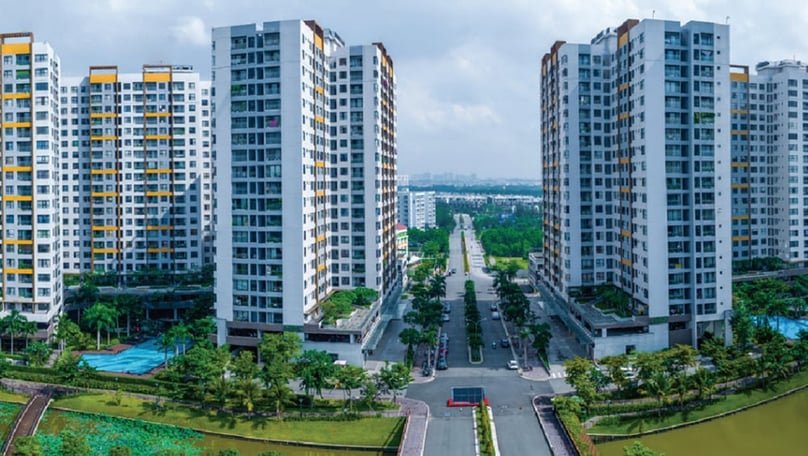By
Thuy Yen, Minh Hue
Mon, July 8, 2024 | 11:01 am GMT+7
Ho Chi Minh City Infrastructure Investment JSC’s (CII) after-tax profit increased four times to VND452 billion ($17.73 million) in the first half of 2024, said CEO Le Quoc Binh.
In H1, CII’s gross profit margin increased from 30% to 56%, helping its gross profit soar 85% to VND885 billion ($34.82 million).
Binh attributed the profit expansion to increased net profit from toll collections by Trung Luong-My Thuan BOT Joint Stock Company, which officially became a subsidiary of CII last October.
Toll collections brought in VND1.31 trillion ($51.54 million) in H1, a year-on-year rise of 84% and contributing 83% of the firm’s total revenue, he said.

A housing project developed by Ho Chi Minh City Infrastructure Investment JSC. Photo courtesy of the company.
However, other segments such as real estate, construction, and building maintenance saw revenues decline. The company also no longer recorded revenue from the water segment after divesting from Saigon Water Infrastructure Corporation (SII).
Its first-half revenue hit VND1.58 trillion ($62.16 million), equivalent to last year.
According to Binh, CII is developing the company’s BOT toll collection segment through its member CII Bridges and Roads Investment JSC (LGC). CII holds 54.84% of LGC’s charter capital, while strategic partner Metro Pacific Tollways has 45%.
LGC is operating and collecting tolls at seven toll stations, with total revenue of VND2.3 trillion ($90.5 million) in 2023. Of which, VND834 billion came from the Trung Luong-My Thuan Expressway BOT project.
In addition to completing the transfer of shares in the Trung Luong-My Thuan Expressway project, he said CII had also coordinated with state agencies to increase toll rates at the expanded National Highway 1 section in the south-central province of Ninh Thuan (Ninh Thuan 2) and Co Chien Bridge from December 29, 2023.
Last year’s total revenue from the two BOT projects reached VND237 billion ($9.32 million), accounting for 10% of the company’s total toll revenue.
The CEO revealed at the 2024 AGM held at the end of May that the company had basically finished negotiations for a contract to acquire an infrastructure project in late June or early July. The project will be put into operation in the first quarter of 2025, with a total investment of VND1.6 trillion ($62.95 million).
After taking over the project, CII plans to double the investment because this road has been likened to the backbone of six southeastern provinces, he said, adding the current four-lane road does not meet travel needs.
In its strategy, the CEO said CII will continue to promote research on new transport infrastructure projects, especially when the legislature’s Resolution 18 creates distinct mechanisms for public-private partnership (PPP) projects in HCMC.
The company will operate in the real estate segment stably, promote the lease of offices and commercial areas, and complete legal documents for projects.
At the end of the second quarter, the company had total debt of VND22.44 trillion, or $882.87 million, including bank loans, bonds, and convertible bonds, 2.4 times the equity and 7 times the charter capital held by the company. Large debt cost the company VND669 billion in interest in H1.
The CEO elaborated that with BOT project investments, the capital structure usually includes 11% equity and 89% debt, which means debt is nine times greater than equity. Therefore, the company’s debt ratio is extremely safe.
On the other hand, in BOT investment, toll revenue will expand over time thanks to increasing vehicle traffic and ticket prices, he added.
CII is aiming for an after-tax profit of VND430 billion ($16.89 million) in 2024, an increase of 10% from 2023.
In particular, the company expects toll collections to achieve revenue of about VND2.44 trillion ($95.82 million), up nearly 45% from 2023.
On the stock market, CII closed Friday at VND15,900 ($0.63) per share.

